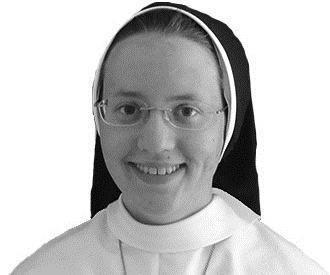Speaking at this summer’s GIVEN Forum, a leadership conference for young Catholic professional women, Michelle Benzinger, a wife, mother, speaker, and author, related a piercing exchange with a high-ranking ecclesiastic, next to whom she happened to be seated at a formal dinner. As the prelate listened with attention to her ideas, she was inspired to ask him, “When is the Church going to have the conversation about …” and she mentioned a contemporary hot-button topic. The archbishop looked her straight in the eyes. “You are the Church. When are you going to have that conversation?”
This is the season of first Communions, confirmations, ordinations, marriages — a season rich in sacraments, all of which should remind me: I am a member of the Body of Christ, the Church. This membership is both a privilege and a responsibility. The privilege? Through the Church, God adopts me as His child and gives me access to His own divine life. He forgives my sins; He feeds me with His own Body and Blood; He lovingly accompanies me in all the moments of my life, and especially in the last one. The responsibility? Problems I see in the Church are mine to fix — as I am able, and beginning with myself.
The archbishop’s comment suggests two significant points: change begins “locally,” and it occurs always because of God’s power.
“I am the Church” means that change begins “locally.” We can never remove the splinter from another’s eye without first removing the log from our own (Matt 7:5). The person whose salvation is of most concern to me, and the only person for whom I will answer in the end, is myself. The battle against evil begins in my own heart. As St. Catherine of Siena would say, we must enter into the cell of self-knowledge, creating through prayer the interior space in which we come to know our own sins and limitations — and, at the same time, recognize God’s unfailing goodness.
I am the Church, and so I must pursue holiness daily, with determination. My own growth in virtue is the greatest contribution I can make to the health of the Church everywhere. And, when I turn the gaze of my charity outward, as is just, the first persons I must love are those closest to me — my own family, my neighbors, my colleagues.
In this work of love and of reform — both of myself and of situations around me — I can be confident of success because the power is not mine but God’s. Here, the emphasis in the archbishop’s words is on “Church”: I am the Church. By baptism, I claim a Father more powerful than any evil, than any suffering. I claim a family of saints, known and unknown, stretching across all ages and all places. The blood that this family shares is the Precious Blood of Jesus Christ, shed on Calvary and ultimately invincible. “Take courage,” He tells us: “in the world you will have trouble, but I have conquered the world” (John 16:33).
Sr. Maria Veritas Marks is a member of the Dominican Sisters of Mary, Mother of the Eucharist.










